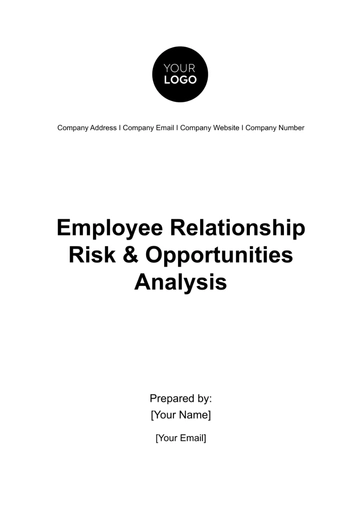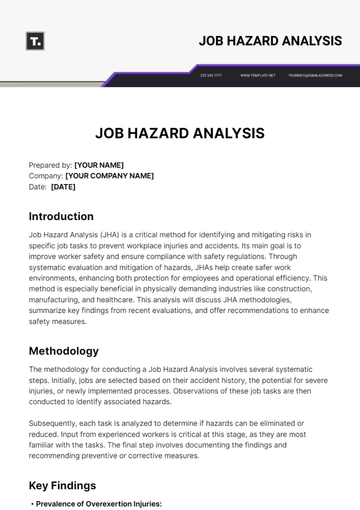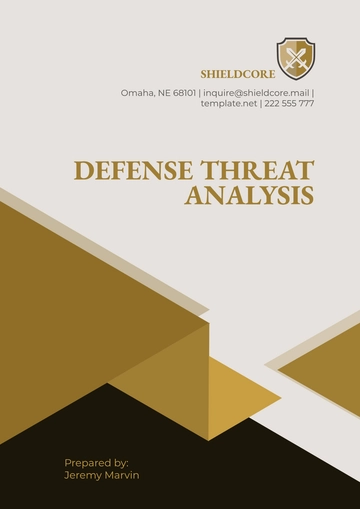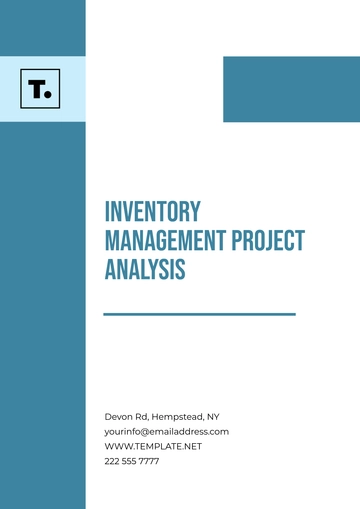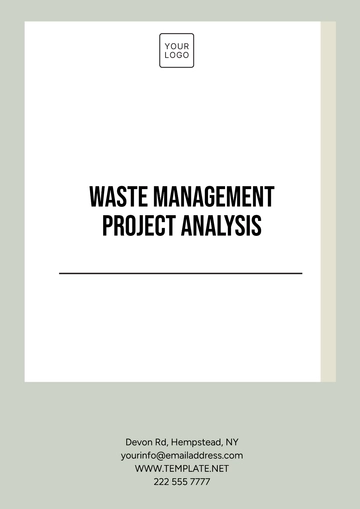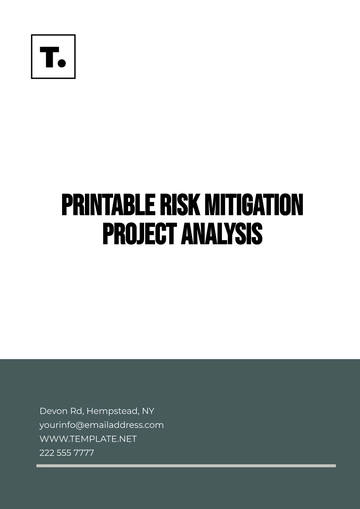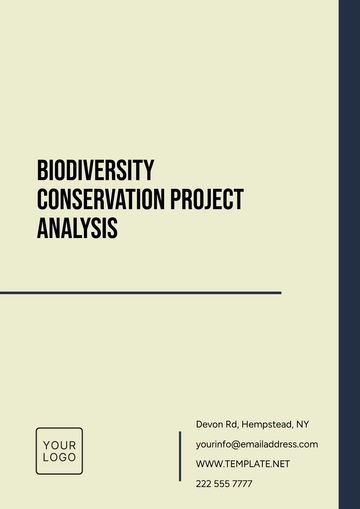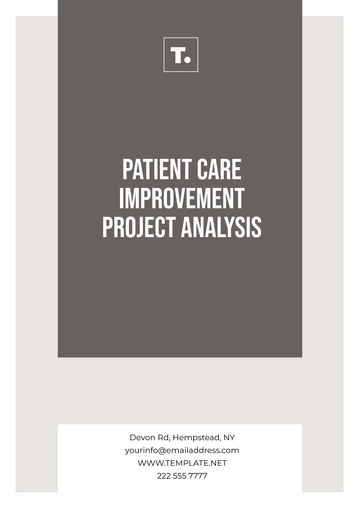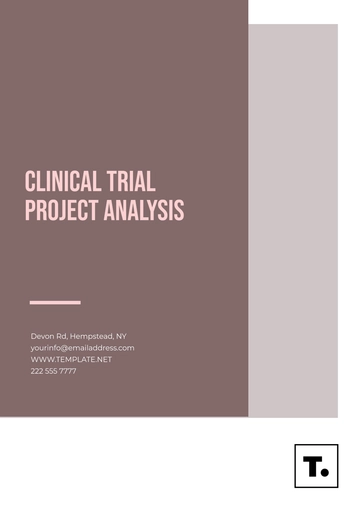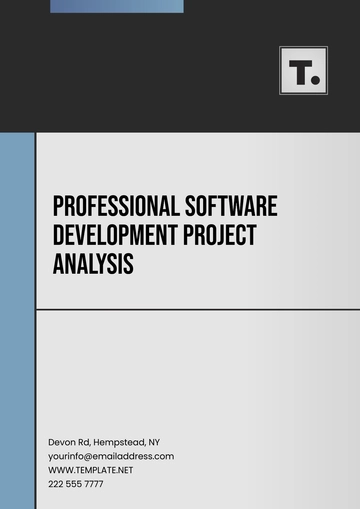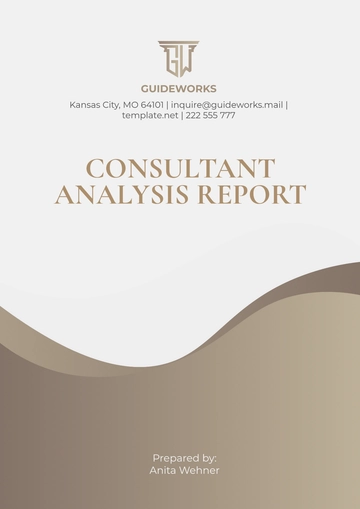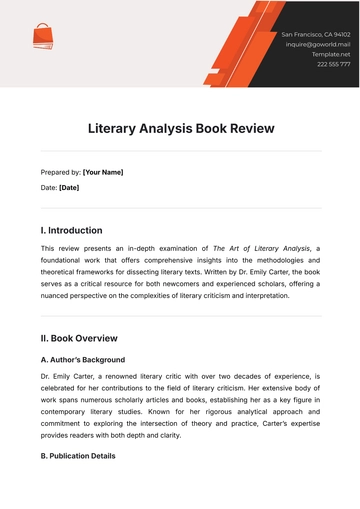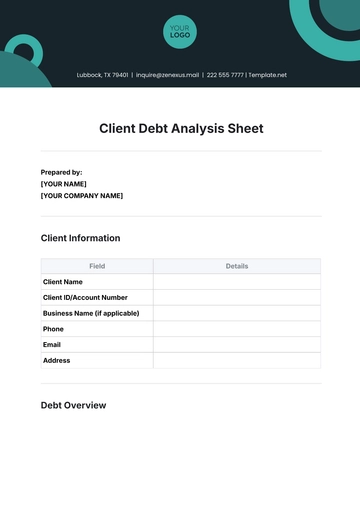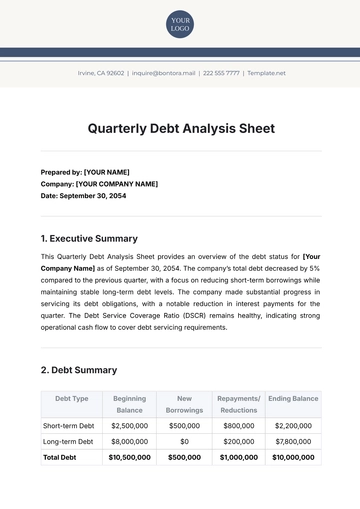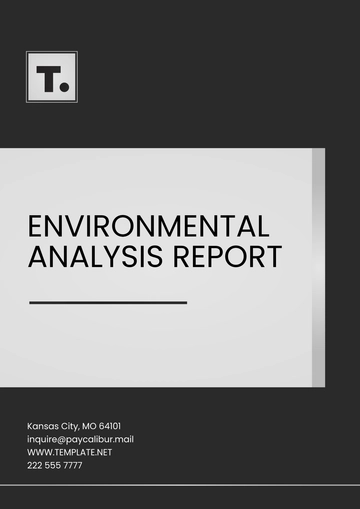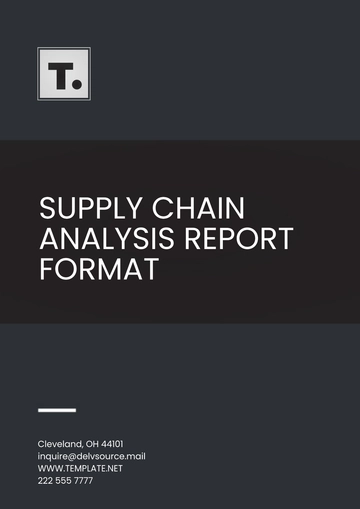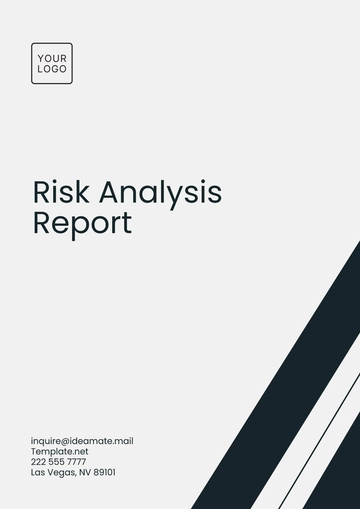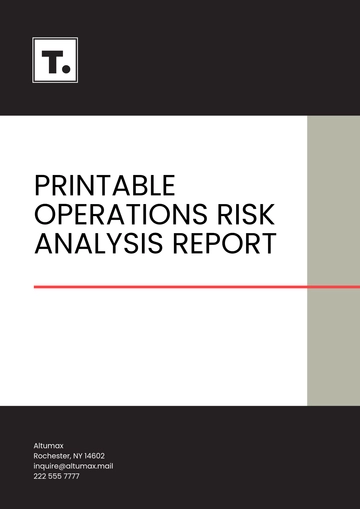Free Law Firm Ethical Analysis
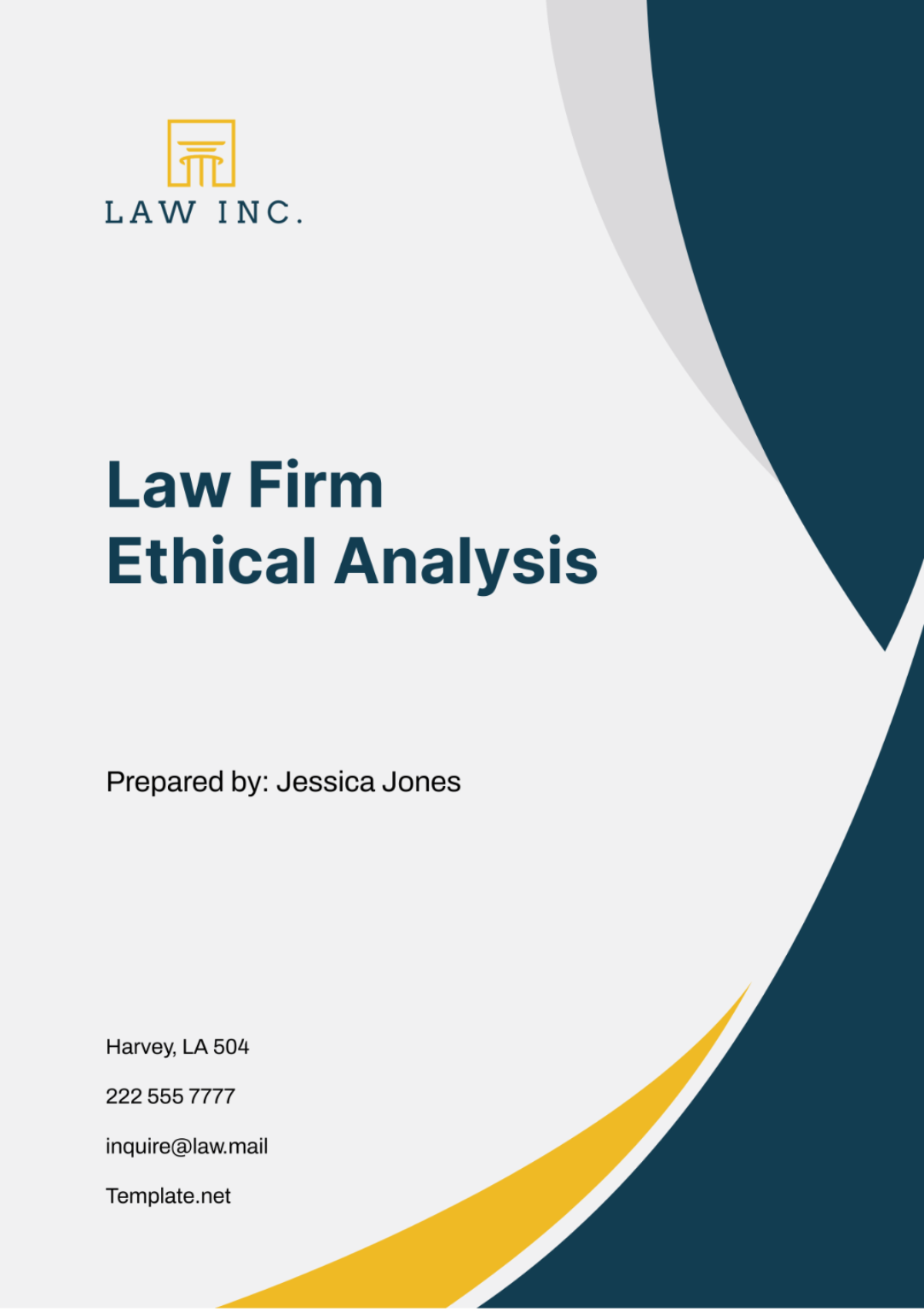
I. Introduction
This analysis of [Your Company Name] undertakes a meticulous examination of the ethical considerations that establish the framework for attorneys and their firms' conduct. It is imperative that legal practitioners adhere to professional standards and regulations to maintain the integrity of the legal profession. The primary objective of this study is to ensure that our law firm and its attorneys consistently uphold these standards while serving our clients and conducting our business affairs. By emphasizing integrity, confidentiality, conflict prevention, and professionalism, we aim to foster trust and uphold the highest ethical standards within our legal practice.
II. Methodology
The methodology employed in this analysis involves a comprehensive examination of seven key sections typically included in a law firm ethical analysis. Each section is scrutinized individually to assess adherence to ethical obligations and professional standards.
A. Evaluative Criteria
Measurable evaluative criteria have been devised to gauge the extent to which the law firm and its attorneys comply with ethical obligations. These criteria provide a structured framework for evaluating ethical conduct and identifying areas for improvement.
B. Data Collection
Various sources of documentation, including firm policies, marketing materials, client contracts, continuing education records, and more, have been meticulously reviewed to gather pertinent data. Additionally, client feedback and attorney interviews have been conducted to supplement the analysis with firsthand insights.
III. Code of Professional Responsibility
The Code of Professional Responsibility serves as the cornerstone of ethical conduct for attorneys and legal practitioners. It outlines the duties and obligations that lawyers must uphold in their interactions with clients, colleagues, and the legal system. Our firm is committed to adhering to the highest standards of professional conduct as set forth in the Code.
A. Duty to Clients
Attorneys have a primary duty to act in the best interests of their clients, providing competent and diligent representation while maintaining confidentiality. This includes promptly responding to client inquiries, providing candid legal advice, and safeguarding client confidences.
B. Avoiding Conflicts of Interest
Lawyers must avoid conflicts of interest that may compromise their ability to represent clients effectively. This entails conducting thorough conflict checks before accepting new clients or matters and obtaining informed consent when conflicts arise.
C. Duty to the Court and the Legal System
Attorneys play a vital role in upholding the integrity of the legal system. They must act with honesty and integrity in their dealings with the court, opposing counsel, and all parties involved in legal proceedings. This includes refraining from making false statements or engaging in deceptive practices.
D. Maintaining Competence
Lawyers have a duty to maintain their competence in the practice of law through ongoing education and professional development. This ensures that they are equipped to provide competent representation to their clients and stay abreast of changes in the law.
E. Professionalism and Civility
Professionalism and civility are essential principles that underpin the practice of law. Attorneys are expected to conduct themselves with courtesy, respect, and integrity in their interactions with clients, colleagues, and the public.
F. Upholding Confidentiality
Client confidentiality is sacrosanct in the legal profession. Attorneys must take all necessary precautions to protect client confidences and privileged communications, even in the face of legal or ethical dilemmas.
G. Ethical Advertising and Solicitation
Lawyers are subject to strict regulations governing the advertising and solicitation of legal services. Any marketing materials or communications must be truthful, accurate, and not misleading, and must comply with applicable ethical rules and guidelines.
IV. Conflicts of Interest
Conflicts of interest pose a significant ethical challenge for law firms, as they have the potential to undermine client trust and compromise the integrity of legal representation. Our firm recognizes the importance of identifying and addressing conflicts of interest promptly and effectively to safeguard the interests of our clients.
We have implemented robust conflict-checking procedures to identify potential conflicts before taking on new clients or matters:
Conflict Check Database: We maintain a comprehensive database that contains information about current and former clients, adverse parties, and other relevant entities. Before accepting a new client or matter, our attorneys conduct searches within this database to identify any potential conflicts.
Conflict Questionnaires: Our intake process includes the use of conflict questionnaires that require clients to disclose any relationships or connections that may give rise to conflicts of interest. This helps us uncover potential conflicts at the outset of the engagement.
Attorney Interviews: Attorneys involved in new client intake or matter acceptance undergo thorough interviews to ascertain any personal or professional relationships that could present conflicts of interest. This proactive approach helps uncover potential conflicts that may not be readily apparent.
Review of Related Matters: Our attorneys review the details of related matters or cases to determine if there are any conflicts of interest that may arise from representing a new client or taking on a new matter. This involves analyzing case files, conflict memoranda, and other relevant documentation.
Outside Vendor Services: In some cases, we may engage outside vendor services that specialize in conflict checking and resolution. These services use advanced technology and databases to conduct thorough searches for potential conflicts across various jurisdictions and industries.
Regular Training and Education: Our attorneys undergo regular training and education on conflict of interest issues and ethical considerations. This helps ensure that they are aware of their obligations and can effectively identify and address potential conflicts in their practice.
V. Client Confidentiality and Privilege
Client confidentiality and privilege are fundamental principles in the attorney-client relationship, requiring the utmost diligence and discretion to uphold. Our firm is dedicated to maintaining the confidentiality of client information and protecting privileged communications.
A. Confidentiality
1. Duty of Confidentiality: Attorneys have a duty to keep client information confidential, including all communications, documents, and other materials related to the representation.
2. Safeguarding Client Information: We employ strict protocols and security measures to safeguard client information, including encryption, secure storage systems, and limited access to sensitive data.
B. Attorney-Client Privilege
1. Nature of Privilege: The attorney-client privilege protects confidential communications between attorneys and their clients from disclosure in legal proceedings.
2. Scope of Privilege: Privileged communications encompass any communications made for the purpose of seeking or providing legal advice, regardless of whether litigation is contemplated.
C. Exceptions and Waivers
1. Exceptions to Confidentiality: While confidentiality is generally paramount, there are limited circumstances where attorneys may be required or permitted to disclose confidential information, such as to prevent imminent harm or comply with legal obligations.
2. Waiver of Privilege: Clients may waive the attorney-client privilege voluntarily or inadvertently, affecting the confidentiality of certain communications.
VI. Advertising and Solicitation
Advertising and solicitation play a crucial role in promoting legal services and attracting clients, but they must be conducted in a manner that is ethical, honest, and compliant with relevant regulations. Our firm adheres to strict guidelines to ensure that our advertising and solicitation practices uphold the integrity of the legal profession.
A. Ethical Considerations
1. Truthfulness and Accuracy: All advertising materials must be truthful, accurate, and not misleading. We ensure that our advertisements provide clear and transparent information about our services, qualifications, and fees.
2. Avoidance of Deceptive Practices: Our firm refrains from engaging in deceptive or misleading advertising practices, such as making false or exaggerated claims about our capabilities or results.
B. Compliance with Regulatory Requirements
1. State Bar Rules: We adhere to the rules and regulations set forth by the state bar association regarding attorney advertising and solicitation. This includes requirements related to content, format, and disclosure.
2. Advertising Review Process: Before disseminating any advertising materials, our firm conducts a thorough review to ensure compliance with applicable rules and regulations. This review process includes legal review by our attorneys and consultation with marketing professionals if necessary.
C. Client Solicitation
1. Prohibition Against In-person Solicitation: Our firm strictly adheres to the prohibition against in-person solicitation of clients in certain circumstances, as outlined by state bar rules and regulations.
2. Written Communication: When soliciting clients through written communication, such as letters or emails, we ensure that the communication complies with relevant ethical guidelines and provides recipients with clear information about their rights and options.
D. Client Testimonials and Endorsements
1. Use of Testimonials: We exercise caution when using client testimonials or endorsements in our advertising materials, ensuring that they are truthful, accurate, and compliant with regulatory requirements.
2. Disclosure of Compensation: If clients are compensated for providing testimonials or endorsements, we disclose this information in accordance with applicable rules and regulations.
VII. Professional Conduct and Civility
Maintaining professional conduct and civility is paramount in fostering trust, respect, and cooperation within the legal profession. Our firm is committed to upholding the highest standards of professionalism in all aspects of our practice, both within our internal operations and in our interactions with clients, colleagues, and the broader legal community.
We prioritize courteous and respectful communication in all dealings, whether with clients, opposing counsel, or members of the judiciary. Our attorneys are held to the highest standards of integrity, honesty, and ethical behavior, ensuring that they represent our firm with professionalism and civility in every interaction.
VIII. Continuing Legal Education and Professional Development
Continuing legal education (CLE) and professional development are integral components of maintaining competence, enhancing skills, and staying abreast of developments in the legal field. Our firm places a high priority on supporting the ongoing education and professional growth of our attorneys to ensure that they provide the highest quality legal representation to our clients.
A. Commitment to Ongoing Education
1. Mandatory CLE Requirements: We adhere to state bar requirements for mandatory continuing legal education, ensuring that our attorneys fulfill their obligations to maintain licensure and stay informed about changes in the law.
2. Encouraging Lifelong Learning: In addition to fulfilling mandatory requirements, we encourage our attorneys to pursue a diverse range of CLE opportunities that align with their practice areas and professional interests. This includes attending seminars, webinars, workshops, and conferences offered by reputable providers.
B. Professional Development Initiatives
1. Mentoring Programs: We offer mentoring programs that pair junior attorneys with experienced mentors to provide guidance, support, and opportunities for skill development.
2. Networking and Collaboration: We facilitate networking opportunities and encourage collaboration among attorneys within the firm and with external legal professionals. This fosters knowledge sharing, idea exchange, and professional growth.
C. Access to Resources and Tools
1. Legal Research Resources: Our firm provides access to comprehensive legal research tools and databases to facilitate efficient and effective legal research and analysis.
2. Skill Enhancement Workshops: We offer skill enhancement workshops and training sessions covering topics such as legal writing, negotiation, and trial advocacy to help attorneys develop practical skills that are essential for success in their practice areas.
D. Recognition and Reward
1. Acknowledgment of Achievements: We recognize and celebrate the accomplishments of our attorneys in their pursuit of ongoing education and professional development, fostering a culture that values continuous learning and growth.
2. Career Advancement Opportunities: Attorneys who demonstrate a commitment to ongoing education and professional development may be eligible for career advancement opportunities within the firm, such as leadership roles or specialized practice areas.
In conclusion, this Law Firm Ethical Analysis underscores our firm's unwavering commitment to upholding the highest standards of ethical conduct in the practice of law. By adhering to the principles outlined in this analysis, we ensure integrity, protect client interests, and maintain the trust and confidence of the communities we serve. We remain dedicated to continuously evaluating and enhancing our ethical practices to uphold the integrity of the legal profession.
- 100% Customizable, free editor
- Access 1 Million+ Templates, photo’s & graphics
- Download or share as a template
- Click and replace photos, graphics, text, backgrounds
- Resize, crop, AI write & more
- Access advanced editor
Ensure integrity and compliance with the Law Firm Ethical Analysis Template from Template.net. This editable and customizable template assists in evaluating the ethical considerations of various legal actions and decisions. Editable in our Ai Editor Tool, it's crucial for maintaining the highest standards of professional conduct, avoiding conflicts of interest, and safeguarding your firm’s reputation by ensuring all practices are aligned with legal ethics and guidelines.
